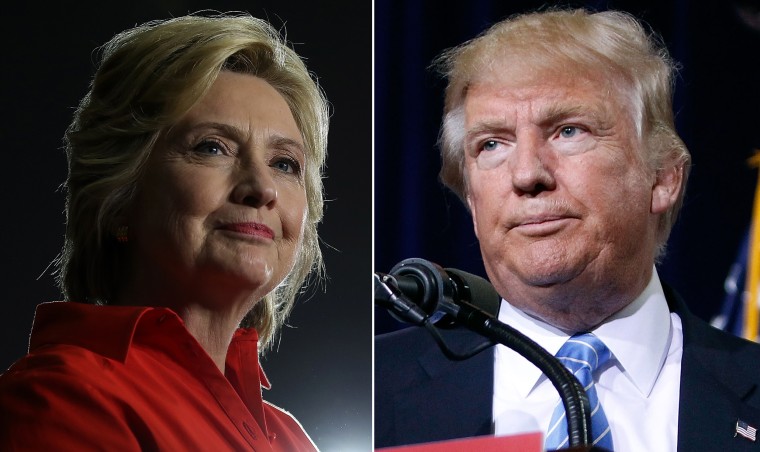Just over eight weeks from Election Day, Democrat Hillary Clinton and Republican Donald Trump are essentially deadlocked in four presidential battleground states — ranging from red Arizona and Georgia to blue-ish Nevada and New Hampshire, according to four new NBC News/Wall Street Journal/Marist polls.
In Arizona, which Republicans have carried in every presidential election since 2000, Trump leads Clinton among likely voters by one point, 42 percent to 41 percent. (Among the larger group of all registered voters, it’s Clinton 41 percent, Trump 40 percent.)

In Georgia, which the GOP has won since 1996, Trump is ahead by three points among likely voters, 46 percent to 43 percent. (Among registered voters, the candidates are tied at 44 percent each.)

In Nevada, which Barack Obama carried in 2008 and 2012, Clinton is up by one point, 45 percent to 44 percent (but she’s ahead by five points among registered voters, 46 percent to 41 percent).

And in New Hampshire, which Obama also won in the last two presidential elections, Clinton leads Trump by one point, 42 percent to 41 percent (and they’re tied at 40 percent each among registered voters).

All of these results are within each poll’s margin of error. The surveys were conducted Sept. 6-8.
“As we enter the final lap of this very unconventional election, it would not be surprising if the electoral map in the end has new contours,” says Lee Miringoff, director of the Marist College Institute for Public Opinion. “Any of these four states could awaken a fault line in what is looking more and more like a shake-up election with more states being up for grabs.”
The race in these states remains equally close when the ballot is expanded to three and four candidates, including Libertarian nominee Gary Johnson and the Green Party’s Jill Stein.
In Arizona, Trump gets 40 percent, Clinton gets 38 percent, Johnson gets 12 percent and Stein gets 3 percent.
In Georgia, it’s Trump at 44 percent, Clinton at 42 percent and Johnson at 10 percent. (Stein isn’t on the ballot in Georgia.)
In Nevada, it’s Trump at 42 percent, Clinton at 41 percent, Johnson at 8 percent and Stein at 3 percent.
And in New Hampshire, it’s Clinton at 39 percent, Trump at 37 percent, Johnson at 15 percent and Stein at 3 percent.
GOP Ahead in All Four Senate Contests
All four states also feature contested Senate races, and Republicans lead in all of them, although Nevada is well within the poll’s margin of error.
In Arizona, incumbent Republican Sen. John McCain leads Democratic challenger Ann Kirkpatrick by 19 points among likely voters, 57 percent to 38 percent. (The result is the same among all registered voters.)
In Georgia, incumbent GOP Sen. Johnny Isakson leads Democrat Jim Barksdale by 15 points, 53 percent to 38 percent.
In Nevada, which is one of the key Senate races this cycle, Republican Joe Heck gets 47 percent among likely voters, while Democrat Catherine Cortez Masto gets 45 percent. (Among registered voters, it’s Cortez Masto 46 percent, Heck 45 percent.)
And in New Hampshire, which could end up deciding control of the Senate, incumbent GOP Sen. Kelly Ayotte leads Democratic challenger Maggie Hassan by eight points among likely voters, 52 percent to 44 percent. (And among registered voters, Ayotte’s lead is seven points, 51 percent to 44 percent.)
The NBC/WSJ/Marist polls were conducted Sept. 6-8. In Arizona, the poll interviewed 946 registered voters (which has a margin of error of plus-minus 3.2 percentage points) and 649 likely voters (plus-minus 3.8 percentage points) by landline and cell phone.
In Georgia, the survey interviewed 913 registered voters (plus-minus 3.2 percentage points) and 625 likely voters (plus-minus 3.9 percentage points).
In Nevada, it interviewed 915 registered voters (plus-minus 3.2 percentage points) and 627 likely voters (plus-minus 3.9 percentage points).
And in New Hampshire, it interviewed 987 registered voters (plus-minus 3.1 percentage points) and 737 likely voters (plus-minus 3.6 percentage points).

